新目标英语7B unit6 I'm watching TV SectionB课件 (共50张PPT)
文档属性
| 名称 | 新目标英语7B unit6 I'm watching TV SectionB课件 (共50张PPT) |
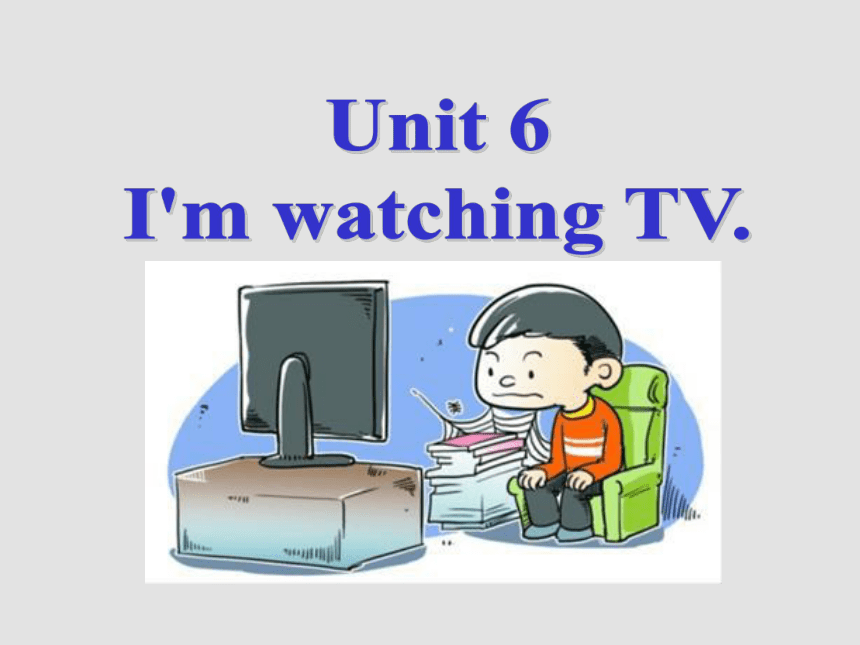
|
|
| 格式 | zip | ||
| 文件大小 | 3.9MB | ||
| 资源类型 | 教案 | ||
| 版本资源 | 人教新目标(Go for it)版 | ||
| 科目 | 英语 | ||
| 更新时间 | 2017-04-07 00:00:00 | ||
图片预览

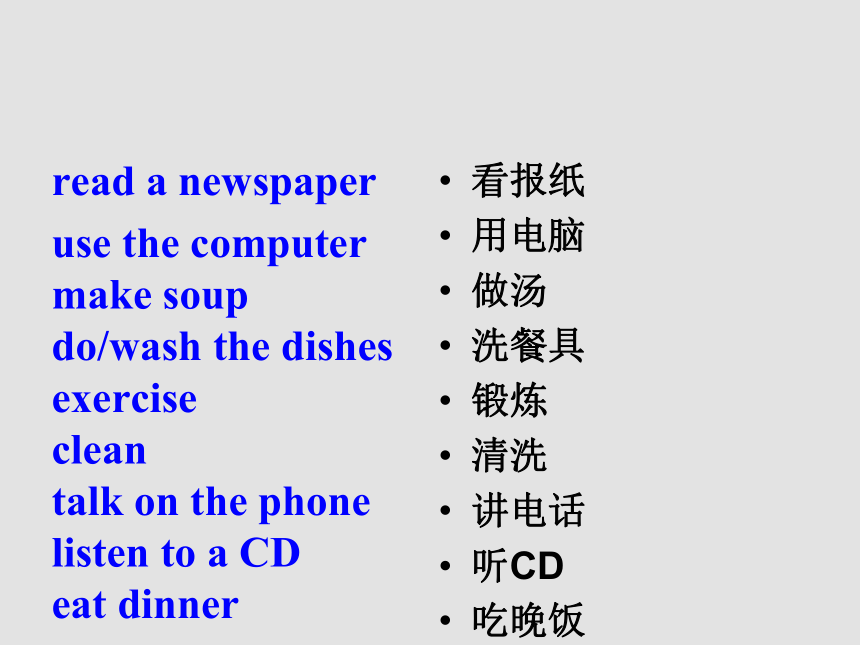
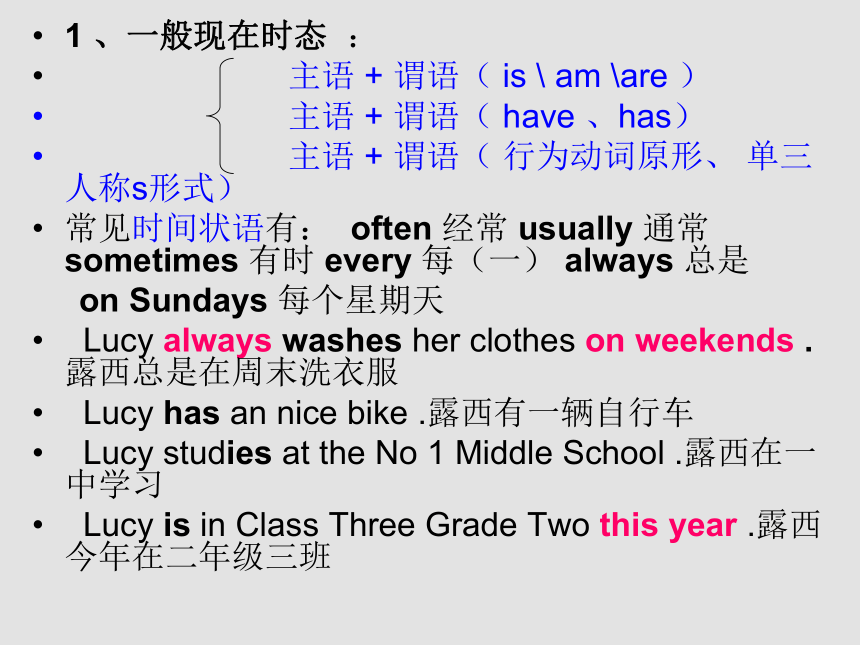
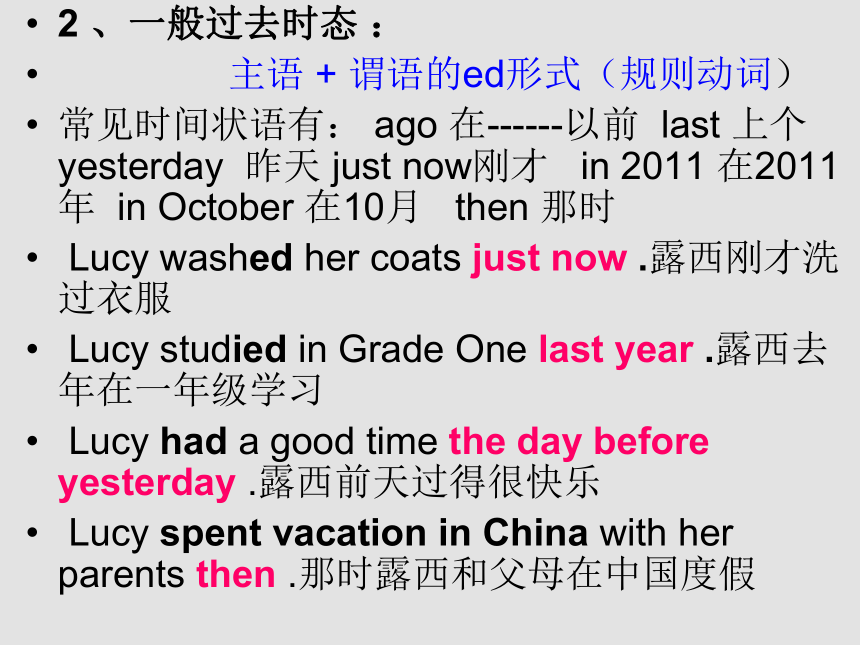
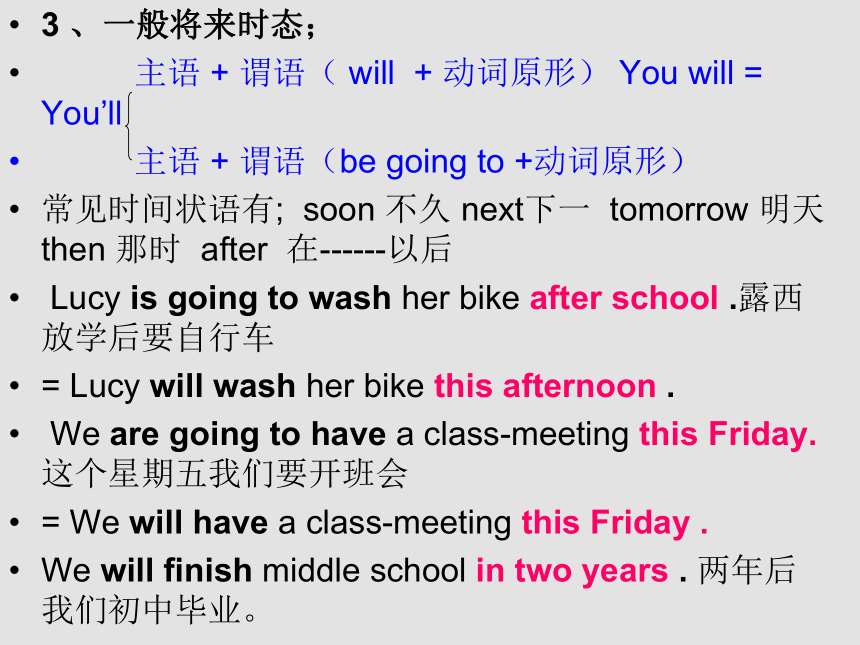
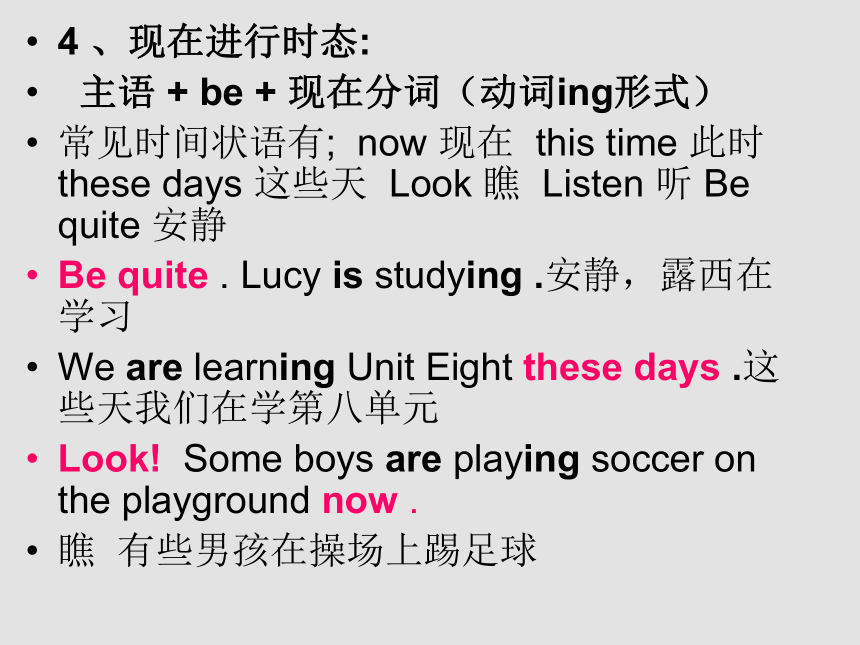
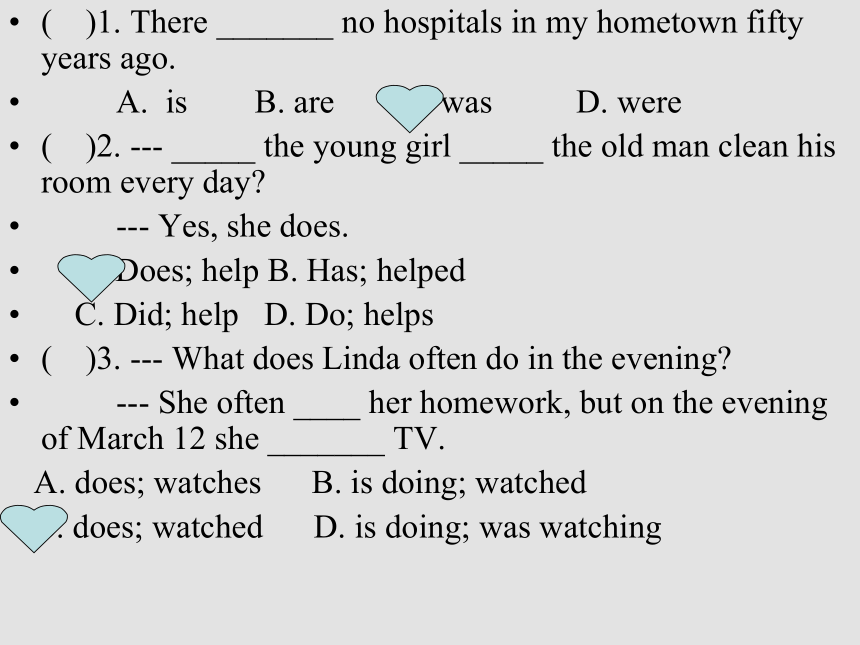
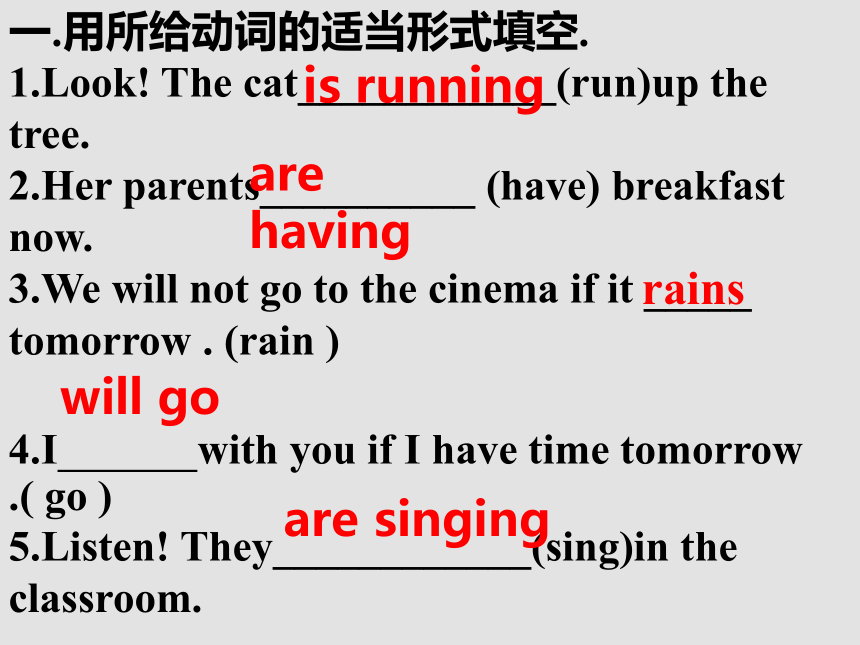


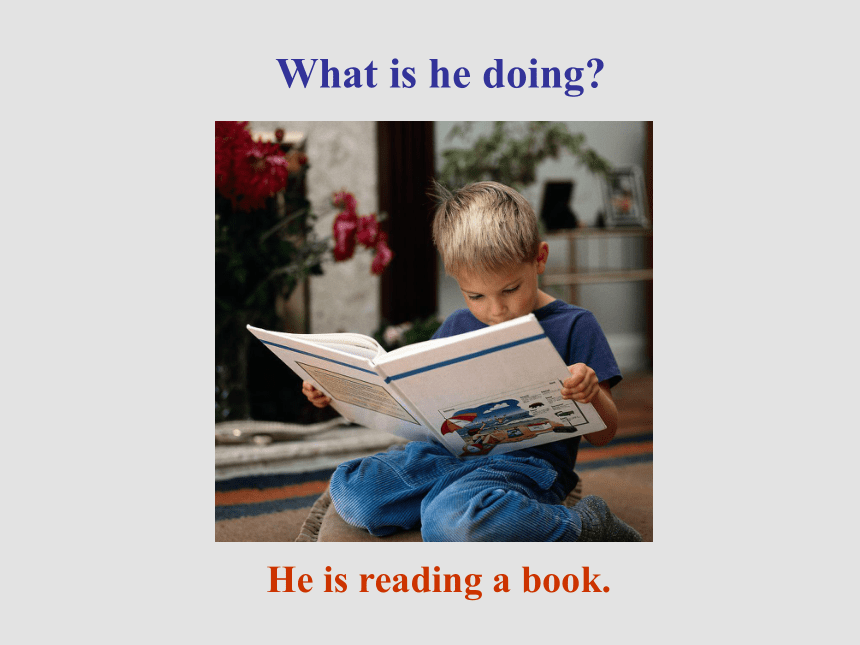
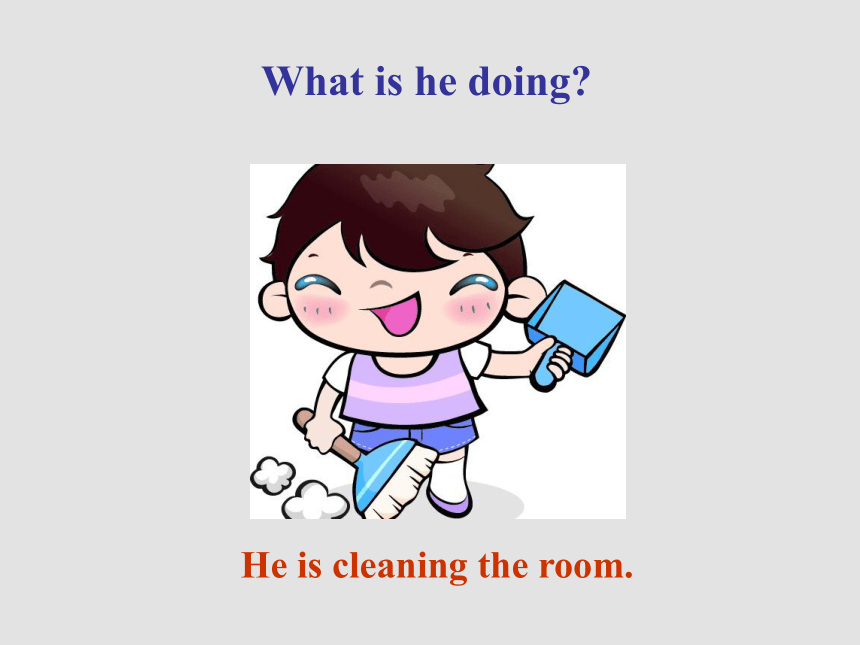
文档简介
课件50张PPT。Unit 6
I'm watching TV.read a newspaper
use the computer
make soup
do/wash the dishes
exercise
clean
talk on the phone
listen to a CD
eat dinner
看报纸
用电脑
做汤
洗餐具
锻炼
清洗
讲电话
听CD
吃晚饭1 、一般现在时态 :
主语 + 谓语( is am are )
主语 + 谓语( have 、has)
主语 + 谓语( 行为动词原形、 单三人称s形式)
常见时间状语有: often 经常 usually 通常 sometimes 有时 every 每(一) always 总是
on Sundays 每个星期天
Lucy always washes her clothes on weekends .露西总是在周末洗衣服
Lucy has an nice bike .露西有一辆自行车
Lucy studies at the No 1 Middle School .露西在一中学习
Lucy is in Class Three Grade Two this year .露西今年在二年级三班2 、一般过去时态 :
主语 + 谓语的ed形式(规则动词)
常见时间状语有: ago 在------以前 last 上个 yesterday 昨天 just now刚才 in 2011 在2011年 in October 在10月 then 那时
Lucy washed her coats just now .露西刚才洗过衣服
Lucy studied in Grade One last year .露西去年在一年级学习
Lucy had a good time the day before yesterday .露西前天过得很快乐
Lucy spent vacation in China with her parents then .那时露西和父母在中国度假3 、一般将来时态;
主语 + 谓语( will + 动词原形) You will = You’ll
主语 + 谓语(be going to +动词原形)
常见时间状语有; soon 不久 next下一 tomorrow 明天 then 那时 after 在------以后
Lucy is going to wash her bike after school .露西放学后要自行车
= Lucy will wash her bike this afternoon .
We are going to have a class-meeting this Friday.这个星期五我们要开班会
= We will have a class-meeting this Friday .
We will finish middle school in two years . 两年后我们初中毕业。4 、现在进行时态:
主语 + be + 现在分词(动词ing形式)
常见时间状语有; now 现在 this time 此时 these days 这些天 Look 瞧 Listen 听 Be quite 安静
Be quite . Lucy is studying .安静,露西在学习
We are learning Unit Eight these days .这些天我们在学第八单元
Look! Some boys are playing soccer on the playground now .
瞧 有些男孩在操场上踢足球( )1. There _______ no hospitals in my hometown fifty years ago.
A. is B. are C. was D. were
( )2. --- _____ the young girl _____ the old man clean his room every day?
--- Yes, she does.
A. Does; help B. Has; helped
C. Did; help D. Do; helps
( )3. --- What does Linda often do in the evening?
--- She often ____ her homework, but on the evening of March 12 she _______ TV.
A. does; watches B. is doing; watched
C. does; watched D. is doing; was watching
一.用所给动词的适当形式填空.
1.Look! The cat____________(run)up the tree.
2.Her parents__________ (have) breakfast
now.
3.We will not go to the cinema if it _____ tomorrow . (rain )
4.I with you if I have time tomorrow .( go )
5.Listen! They____________(sing)in the classroom.is runningare having will go are singingrainsLook and Say!What are they doing?She is talking on the phone.What is she doing?He is reading a book.What is he doing?He is cleaning the room.What is he doing?They are watching TV.What are they doing?He is playing computer games.What is he doing?She is painting / drawing.What is she doing?Is she running?
Yes, she is.Are they singing?
No, they aren’t. They are exercising.Is she doing homework?
Yes, she is.What is she doing?Is he playing the piano?
No, he isn’t. He is playing the guitar.Do you know these places?poolHe is swimming in the pool.They are shopping in the supermarket.supermarketplaygroundHe is playing basketball on the playground.libraryHe is reading in the library.1a Look at the pictures. Complete the chart.poolswimmingsupermarketshoppinglibraryreading (books)Reading and answeringWhat is Jenny doing?
Jenny is watching TV.
What is Laura doing?
Laura is washing her clothes.
When will they meet ?
They will meet at half past six.
Are Jenny’s parents at home?
No, they aren’t.
Jenny: Hello? This is Jenny.
Laura: Hi, Jenny. It’s Laura here.
Jenny: Oh, hi, Laura. What are you doing?
Laura: Not much. I’m just washing my clothes. What about you?
Jenny: I’m watching TV. Do you want to join me for dinner? My parents aren’t at home. We can eat out.
Laura: Yeah. I’d love to.
Jenny: Let’s meet at my home first. Come at half past six.
Laura: Ok. See you then.打电话专用语Who’s that (speaking)? 你是谁?
Who’s speaking? 谁在讲话?
May/ Could I speak to …? 请…接电话好吗?
Is that …(speaking). 你是…吗?
This is …(speaking). 我是…
Hold on, please.请等一会儿。
Hold on for a moment/minute. 请稍等。--- Hello, this is Wendy. Can I speak to Jessica?
--- Yes, ____.
A. Jessica is me
B. Jessica, please
C. my name is Jessica
D. this is Jessica speaking.I’d love toI’d love to.= I’d like to.
I’d = I would
常用来回答 would you like to…?
A:Would you like to play football with me?
你想和我一起去踢足球吗?
B1: Yes, I’d love/like to.
是的,我非常愿意。
B2: I’d love/like to. But I’m too busy.
我非常愿意,但是我太忙了。--- Ben, would you like to play football with us?
---_____, but I have to wash the dishes first.
A. No, I can’t. B. I don’t want to.
C. Yes, please. D. I’d love to.Paragraph 1
Paragraph 2It talks about what Zhu Hui and his host family are doing.
It talks about What Zhu Hui’s family are doing in Shenzhen. Why are Zhu Hui’s family watching boat races and making zongzi? ___________________________________
Because today is the Dragon Boat Festival.Fast Reading2. Does Zhu Hui like his host family? ______________
3. What does he think about his home in China? ________________________________________________________________Yes, he does.He misses his family and wishes to have his mom’s delicious zongzi.Read the article again then fill in the blanks below.are making zongzi9:00 a.m.are watching the boat races on TVis talking on the phone to his cousin in Shenzhen9:00 p.m.is watching a soccer game on TVis reading a story to her young childrenB
food
in the US
a race
with a family
on the phone
a storyA
living
reading
making
talking studying
watching2c Match the verbs in column A with the words
in column B. Then use the phrases to write
sentences according to the TV report.Today’s story is about Zhu Hui, a student from Shenzhen. He’s now studying in the United States. He’s living with an American family in New York. Today is the Dragon Boat Festival. It’s 9:00 a.m. and Zhu Hui’s family are at home. His mom and aunt are making zongzi. His dad and uncle are watching the boat races on TV.
Is Zhu Hui also watching the races and eating zongzi? Well, it’s 9 p.m. in New York, and it’s the night before the festival. But there isn’t a Dragon Boat Festival in the US, so it’s like any other night for Zhu Hui and his host family. The mother is reading a story to her young children. The father is watching a soccer game on TV. And what’s Zhu Hui doing? He’s talking on the phone to his cousin in Shenzhen. Zhu Hui misses his family and wished to have his mom’s delicious zongzi. Zhu Hui likes New York and his host family a lot, but there’s still “ no place like home”.Today’s story is about Zhu Hui, a student from Shenzhen. He’s now studying in the United States. He’s living with an American family in New York. Today is the Dragon Boat Festival. It’s 9:00 a.m. and Zhu Hui’s family are at home. His mom and aunt are making zongzi. His dad and uncle are watching the boat races on TV.
Is Zhu Hui also watching the races and eating zongzi? Well, it’s 9 p.m. in New York, and it’s the night before the festival. But there isn’t a Dragon Boat Festival in the US, so it’s like any other night for Zhu Hui and his host family. The mother is reading a story to her young children. The father is watching a soccer game on TV. And what’s Zhu Hui doing? He’s talking on the phone to his cousin in Shenzhen. Zhu Hui misses his family and wished to have his mom’s delicious zongzi. Zhu Hui likes New York and his host family a lot, but there’s still “ no place like home”.1. His dad and uncle are watching the
boat races on TV.
race用于体育话题时,主要指赛跑,赛
车,游泳等与速度有关的“比赛”;而
game则多指球类,棋类等体育“比赛”。
e.g. Do you like to watch NBA games on TV?
He’s the youngest swimmer in the race.Language points2. any other + 名词单数形式 意为“(除了某个以外)其他的任何一个”
Jack is like any other boy of his age.
杰克看上去像其他和他同龄的孩子一样。
【注意】 any 意为“任何的;任一的”。
You can take any book. 你可以拿走任意一本书。
Any child will love them. 任何一个小孩都会喜欢它们。otheroneoneonethe other fourthe othersomeothersthe othersI have two pencils. One is red; the other is green.
He is taller than all the other children in the class.
A lot of people are in the park. Some are singing; others are dancing.
I went swimming while the others played tennis.We have two foreign teachers here. One is from England, and _____ is from America.
A. another B. the other
C. other D. the others3. miss v. 意为“思念;想念”
How’s it going? I miss you very much. 你那里还好吗?我很想念你们。
【注意】miss的第三人称单数形式为:misses
e.g. The little girl misses her grandma very
much. 小女孩很想念她的奶奶。
【拓展】 miss还有“错过,没赶上”之意。
e.g. Get up quickly, or you will miss the bus. 赶快起床,否则你会赶不上公共汽车。 4. wish v. 意为“希望”;常用结构:wish
to do sth. 或wish sb. to do sth.
e.g. I wish to meet my uncle there.
我希望在那里能见到我的叔叔。
I wish I could fly like a bird.
我希望我能够像鸟一样飞。
hope to do sth, hope that
I hope that I can find a good job.5. …but there’s still “no place like home”.
但是“千好万好还是不如自己的家好”。(金窝银窝不如自己的狗窝。)
还有一句谚语: East, west, home is best.1. 像其他小孩子一样,迈克喜欢冰淇淋。 Just like ___ _____ kid, Mike likes ice cream.
2. 小明的祖父母正在包粽子。 Xiaoming’s grandparents ___ ______ zongzi.
3. 你想念你在中国的家人吗? Do you ____ your _____ in China? 练一练miss familyany otherare making4. 她希望格雷丝来参加她的生日聚会。 She ______ Grace _____ to her birthday party.
5. 李娜现在和一个美国家庭住在纽约。 Li Na __ _____ ____ an ________ family in New York now. wishes comeis living with American一. 熟读2b中的电视报道文章。 二. 用下列词汇造句子: 1. in the United States 2. live with 3. any other 4. talk on the phone 5. miss 6. wish to do sth. HomeworkThank you!
I'm watching TV.read a newspaper
use the computer
make soup
do/wash the dishes
exercise
clean
talk on the phone
listen to a CD
eat dinner
看报纸
用电脑
做汤
洗餐具
锻炼
清洗
讲电话
听CD
吃晚饭1 、一般现在时态 :
主语 + 谓语( is am are )
主语 + 谓语( have 、has)
主语 + 谓语( 行为动词原形、 单三人称s形式)
常见时间状语有: often 经常 usually 通常 sometimes 有时 every 每(一) always 总是
on Sundays 每个星期天
Lucy always washes her clothes on weekends .露西总是在周末洗衣服
Lucy has an nice bike .露西有一辆自行车
Lucy studies at the No 1 Middle School .露西在一中学习
Lucy is in Class Three Grade Two this year .露西今年在二年级三班2 、一般过去时态 :
主语 + 谓语的ed形式(规则动词)
常见时间状语有: ago 在------以前 last 上个 yesterday 昨天 just now刚才 in 2011 在2011年 in October 在10月 then 那时
Lucy washed her coats just now .露西刚才洗过衣服
Lucy studied in Grade One last year .露西去年在一年级学习
Lucy had a good time the day before yesterday .露西前天过得很快乐
Lucy spent vacation in China with her parents then .那时露西和父母在中国度假3 、一般将来时态;
主语 + 谓语( will + 动词原形) You will = You’ll
主语 + 谓语(be going to +动词原形)
常见时间状语有; soon 不久 next下一 tomorrow 明天 then 那时 after 在------以后
Lucy is going to wash her bike after school .露西放学后要自行车
= Lucy will wash her bike this afternoon .
We are going to have a class-meeting this Friday.这个星期五我们要开班会
= We will have a class-meeting this Friday .
We will finish middle school in two years . 两年后我们初中毕业。4 、现在进行时态:
主语 + be + 现在分词(动词ing形式)
常见时间状语有; now 现在 this time 此时 these days 这些天 Look 瞧 Listen 听 Be quite 安静
Be quite . Lucy is studying .安静,露西在学习
We are learning Unit Eight these days .这些天我们在学第八单元
Look! Some boys are playing soccer on the playground now .
瞧 有些男孩在操场上踢足球( )1. There _______ no hospitals in my hometown fifty years ago.
A. is B. are C. was D. were
( )2. --- _____ the young girl _____ the old man clean his room every day?
--- Yes, she does.
A. Does; help B. Has; helped
C. Did; help D. Do; helps
( )3. --- What does Linda often do in the evening?
--- She often ____ her homework, but on the evening of March 12 she _______ TV.
A. does; watches B. is doing; watched
C. does; watched D. is doing; was watching
一.用所给动词的适当形式填空.
1.Look! The cat____________(run)up the tree.
2.Her parents__________ (have) breakfast
now.
3.We will not go to the cinema if it _____ tomorrow . (rain )
4.I with you if I have time tomorrow .( go )
5.Listen! They____________(sing)in the classroom.is runningare having will go are singingrainsLook and Say!What are they doing?She is talking on the phone.What is she doing?He is reading a book.What is he doing?He is cleaning the room.What is he doing?They are watching TV.What are they doing?He is playing computer games.What is he doing?She is painting / drawing.What is she doing?Is she running?
Yes, she is.Are they singing?
No, they aren’t. They are exercising.Is she doing homework?
Yes, she is.What is she doing?Is he playing the piano?
No, he isn’t. He is playing the guitar.Do you know these places?poolHe is swimming in the pool.They are shopping in the supermarket.supermarketplaygroundHe is playing basketball on the playground.libraryHe is reading in the library.1a Look at the pictures. Complete the chart.poolswimmingsupermarketshoppinglibraryreading (books)Reading and answeringWhat is Jenny doing?
Jenny is watching TV.
What is Laura doing?
Laura is washing her clothes.
When will they meet ?
They will meet at half past six.
Are Jenny’s parents at home?
No, they aren’t.
Jenny: Hello? This is Jenny.
Laura: Hi, Jenny. It’s Laura here.
Jenny: Oh, hi, Laura. What are you doing?
Laura: Not much. I’m just washing my clothes. What about you?
Jenny: I’m watching TV. Do you want to join me for dinner? My parents aren’t at home. We can eat out.
Laura: Yeah. I’d love to.
Jenny: Let’s meet at my home first. Come at half past six.
Laura: Ok. See you then.打电话专用语Who’s that (speaking)? 你是谁?
Who’s speaking? 谁在讲话?
May/ Could I speak to …? 请…接电话好吗?
Is that …(speaking). 你是…吗?
This is …(speaking). 我是…
Hold on, please.请等一会儿。
Hold on for a moment/minute. 请稍等。--- Hello, this is Wendy. Can I speak to Jessica?
--- Yes, ____.
A. Jessica is me
B. Jessica, please
C. my name is Jessica
D. this is Jessica speaking.I’d love toI’d love to.= I’d like to.
I’d = I would
常用来回答 would you like to…?
A:Would you like to play football with me?
你想和我一起去踢足球吗?
B1: Yes, I’d love/like to.
是的,我非常愿意。
B2: I’d love/like to. But I’m too busy.
我非常愿意,但是我太忙了。--- Ben, would you like to play football with us?
---_____, but I have to wash the dishes first.
A. No, I can’t. B. I don’t want to.
C. Yes, please. D. I’d love to.Paragraph 1
Paragraph 2It talks about what Zhu Hui and his host family are doing.
It talks about What Zhu Hui’s family are doing in Shenzhen. Why are Zhu Hui’s family watching boat races and making zongzi? ___________________________________
Because today is the Dragon Boat Festival.Fast Reading2. Does Zhu Hui like his host family? ______________
3. What does he think about his home in China? ________________________________________________________________Yes, he does.He misses his family and wishes to have his mom’s delicious zongzi.Read the article again then fill in the blanks below.are making zongzi9:00 a.m.are watching the boat races on TVis talking on the phone to his cousin in Shenzhen9:00 p.m.is watching a soccer game on TVis reading a story to her young childrenB
food
in the US
a race
with a family
on the phone
a storyA
living
reading
making
talking studying
watching2c Match the verbs in column A with the words
in column B. Then use the phrases to write
sentences according to the TV report.Today’s story is about Zhu Hui, a student from Shenzhen. He’s now studying in the United States. He’s living with an American family in New York. Today is the Dragon Boat Festival. It’s 9:00 a.m. and Zhu Hui’s family are at home. His mom and aunt are making zongzi. His dad and uncle are watching the boat races on TV.
Is Zhu Hui also watching the races and eating zongzi? Well, it’s 9 p.m. in New York, and it’s the night before the festival. But there isn’t a Dragon Boat Festival in the US, so it’s like any other night for Zhu Hui and his host family. The mother is reading a story to her young children. The father is watching a soccer game on TV. And what’s Zhu Hui doing? He’s talking on the phone to his cousin in Shenzhen. Zhu Hui misses his family and wished to have his mom’s delicious zongzi. Zhu Hui likes New York and his host family a lot, but there’s still “ no place like home”.Today’s story is about Zhu Hui, a student from Shenzhen. He’s now studying in the United States. He’s living with an American family in New York. Today is the Dragon Boat Festival. It’s 9:00 a.m. and Zhu Hui’s family are at home. His mom and aunt are making zongzi. His dad and uncle are watching the boat races on TV.
Is Zhu Hui also watching the races and eating zongzi? Well, it’s 9 p.m. in New York, and it’s the night before the festival. But there isn’t a Dragon Boat Festival in the US, so it’s like any other night for Zhu Hui and his host family. The mother is reading a story to her young children. The father is watching a soccer game on TV. And what’s Zhu Hui doing? He’s talking on the phone to his cousin in Shenzhen. Zhu Hui misses his family and wished to have his mom’s delicious zongzi. Zhu Hui likes New York and his host family a lot, but there’s still “ no place like home”.1. His dad and uncle are watching the
boat races on TV.
race用于体育话题时,主要指赛跑,赛
车,游泳等与速度有关的“比赛”;而
game则多指球类,棋类等体育“比赛”。
e.g. Do you like to watch NBA games on TV?
He’s the youngest swimmer in the race.Language points2. any other + 名词单数形式 意为“(除了某个以外)其他的任何一个”
Jack is like any other boy of his age.
杰克看上去像其他和他同龄的孩子一样。
【注意】 any 意为“任何的;任一的”。
You can take any book. 你可以拿走任意一本书。
Any child will love them. 任何一个小孩都会喜欢它们。otheroneoneonethe other fourthe othersomeothersthe othersI have two pencils. One is red; the other is green.
He is taller than all the other children in the class.
A lot of people are in the park. Some are singing; others are dancing.
I went swimming while the others played tennis.We have two foreign teachers here. One is from England, and _____ is from America.
A. another B. the other
C. other D. the others3. miss v. 意为“思念;想念”
How’s it going? I miss you very much. 你那里还好吗?我很想念你们。
【注意】miss的第三人称单数形式为:misses
e.g. The little girl misses her grandma very
much. 小女孩很想念她的奶奶。
【拓展】 miss还有“错过,没赶上”之意。
e.g. Get up quickly, or you will miss the bus. 赶快起床,否则你会赶不上公共汽车。 4. wish v. 意为“希望”;常用结构:wish
to do sth. 或wish sb. to do sth.
e.g. I wish to meet my uncle there.
我希望在那里能见到我的叔叔。
I wish I could fly like a bird.
我希望我能够像鸟一样飞。
hope to do sth, hope that
I hope that I can find a good job.5. …but there’s still “no place like home”.
但是“千好万好还是不如自己的家好”。(金窝银窝不如自己的狗窝。)
还有一句谚语: East, west, home is best.1. 像其他小孩子一样,迈克喜欢冰淇淋。 Just like ___ _____ kid, Mike likes ice cream.
2. 小明的祖父母正在包粽子。 Xiaoming’s grandparents ___ ______ zongzi.
3. 你想念你在中国的家人吗? Do you ____ your _____ in China? 练一练miss familyany otherare making4. 她希望格雷丝来参加她的生日聚会。 She ______ Grace _____ to her birthday party.
5. 李娜现在和一个美国家庭住在纽约。 Li Na __ _____ ____ an ________ family in New York now. wishes comeis living with American一. 熟读2b中的电视报道文章。 二. 用下列词汇造句子: 1. in the United States 2. live with 3. any other 4. talk on the phone 5. miss 6. wish to do sth. HomeworkThank you!
同课章节目录
- Unit 1 Can you play the guitar?
- Section A
- Section B
- Unit 2 What time do you go to school?
- Section A
- Section B
- Unit 3 How do you get to school?
- Section A
- Section B
- Unit 4 Don't eat in class.
- Section A
- Section B
- Unit 5 Why do you like pandas?
- Section A
- Section B
- Unit 6 I'm watching TV.
- Section A
- Section B
- Review of Units 1-6
- Unit 7 It's raining!
- Section A
- Section B
- Unit 8 Is there a post office near here?
- Section A
- Section B
- Unit 9 What does he look like?
- Section A
- Section B
- Unit 10 I'd like some noodles.
- Section A
- Section B
- Unit 11 How was your school trip?
- Section A
- Section B
- Unit 12 What did you do last weekend?
- Section A
- Section B
